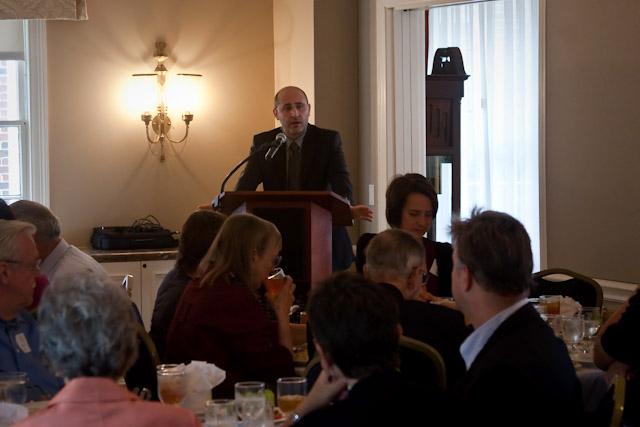
(Spencer Eggers/The Daily Campus)
Sabri Ates, a history professor at Southern Methodist University, gave an overview of the changing political spectrum in the Arab world during the Faculty Club’s luncheon Wednesday. His speech, titled ” The Arab Spring,” traced the current political upheavals to historical conflicts of domination between the Shiites and the Sunni tribes in the region.
The luncheon was organized by SMU’s Faculty Club, which aims to meet the professional, educational and social needs of its members by hosting regular events on diverse topics. It strives to bring various parts of the university together in order to create a more collegial atmosphere. More than 50 SMU alumni and current staff members attended the event.
Ates, who has published several books on the region’s cultural history, defined “spring” as term used to indicate escape or release. Ates said that the uprising in the Middle East has been caused by the need to uproot regimes that have turned into monarchies. He said such monarchies wanted to remain in power while the needs of the majority remain unmet. He traced the upheavals to historical sectarian differences between the Shiite and Sunni Muslims that have fought for political dominance for decades.
Ates said that as a result of dictatorial leadership in the Arab world, many countries in the region felt culturally isolated, with inadequate education and limited economic growth since the 1980s. He identified that Arab leaders remained in power by encouraging Islamophobia, a term meaning prejudice against, hatred or irrational fear of Islam or Muslims. Ates explained that the Arab leaders used scare tactics by telling people that even though they were dictators, those opposing them could lead to worse scenarios.
“As a result, Arabs have the lowest form of freedoms. Unemployment and population explosion causes problems,” Ates said. “Sixty percent of the population is under 24 years of age. This is a formula for a revolt.”
Ates said that although the revolutions have brought people together, they have also brought sectarian divisions to the region because of every country’s unique reason for the upraising.
“Libya needs a state, not a democracy,” Ates said. “Syria? It sits on sectarian fault lines. At stake is the future of the Middle East.”
Ted Campbell, associate professor of church history at SMU, believed Ates provided important historical background about the Arab region.
“We need to ask ourselves what we have done in the past to encourage these regimes,” Campbell said.
According to Ates, the United Nations Development Program had warned world leaders that monumental changes were in the making through its published report in 2004. The report stated that the failure to reform would lead to internal struggles in respective countries or changes would be forced from outside. It also stated that doing nothing meant there was an impending disaster in the region.
Dee Powell, executive assistant in the dean’s office at the Cox School of Business, believed the speech was very informative.
“We are limited by what we see in the news,” Powell said. “It makes you appreciate being in the United States.”








